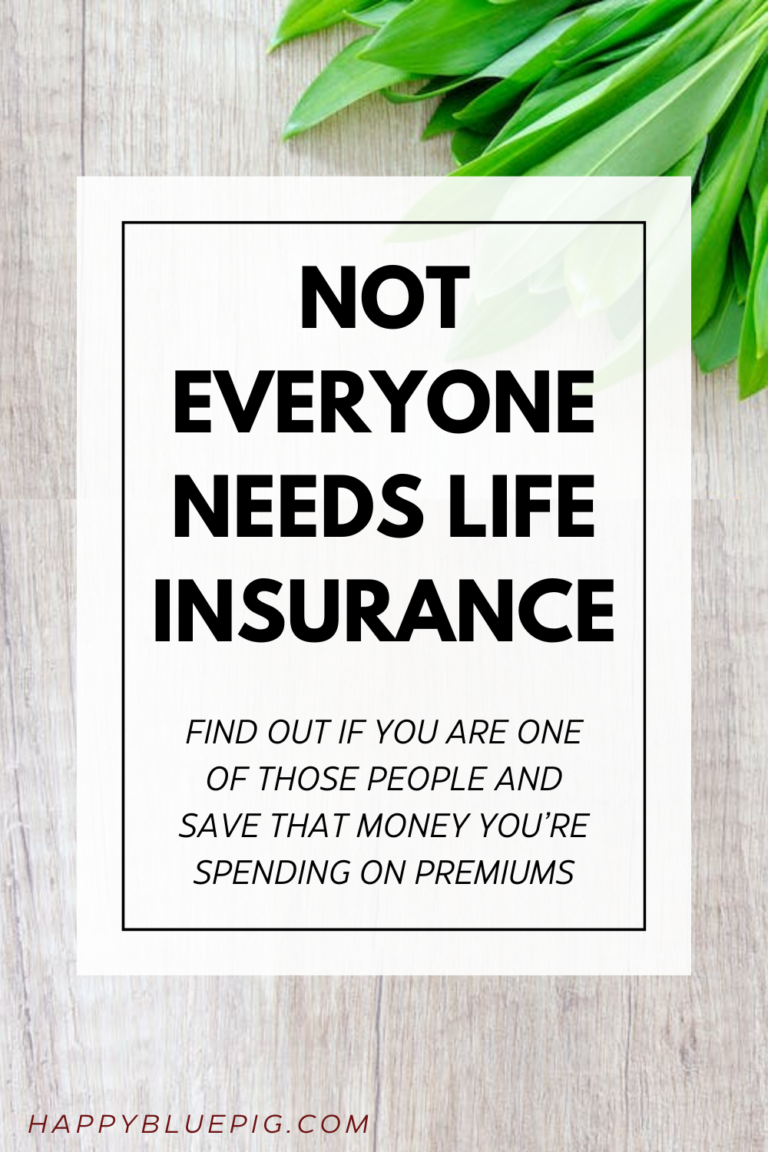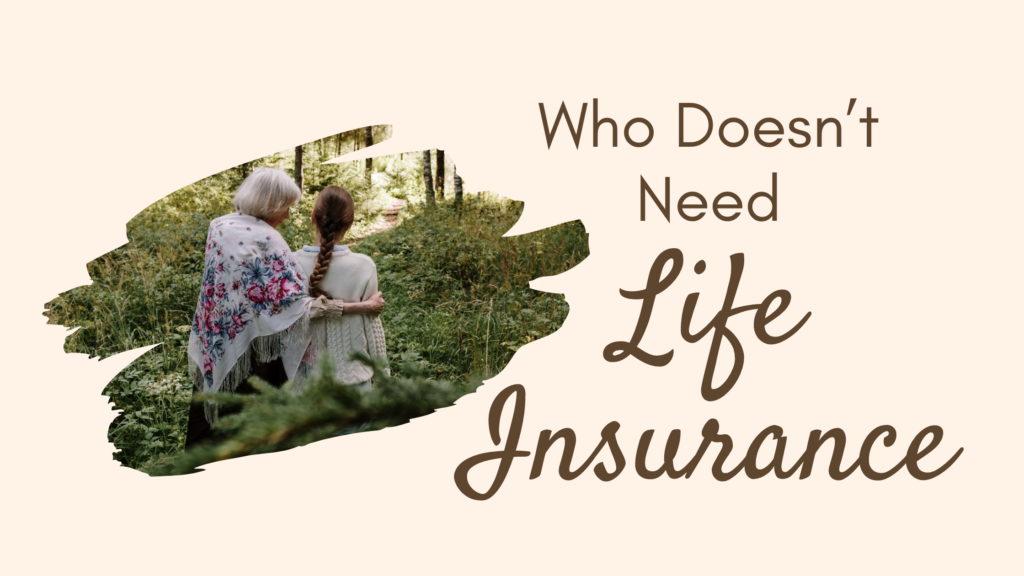Life insurance has an important job: protecting loved ones after we die. But not everyone needs it. Depending on certain financial and family situations, it is a completely unnecessary expense. Who doesn’t need life insurance? There are 3 different kinds of people who don’t: children, single people without dependents, and married couples and people with dependents with enough assets. There are some specific financial and personal factors to consider for each of these when making the decision to purchase life insurance or not. Let’s take a closer look.
This post may contain affiliate links, which means I’ll receive a commission if you purchase through my links, at no extra cost to you. Please read full disclosure for more information.
The Purpose of Life Insurance
First, let’s clear one thing up. The purpose of life insurance is to protect the lifestyle and housing of your loved ones and to keep your loved ones from accumulating more debt. Life insurance should pay for funeral costs, supplement income for a surviving spouse, pay off your debts, or meet other needs of your surviving family. No one likes to think about these things, but it is an important part of caring for those we love.
Some people want a life insurance policy to provide an inheritance to their children. Leaving an inheritance is an awesome goal, but it is not a need. And in my opinion, there are better methods for leaving an inheritance than whole life policies anyway.
Can you cover the cost of a funeral?
Funerals are not cheap. Per the National Funeral Director’s Association, the average cost of a funeral is between $7,000-$8,000. However, if you have sufficient assets to cover the cost of a funeral, you may not need life insurance. If you are debt-free and have an emergency fund, then you likely have enough assets to cover a funeral if you would die. This would protect your family from hardship in the case of an unexpected death. No one wants to think about these things, but we do want to make sure that our family will be protected.

3 Types of People Who Don’t Need Life Insurance
Children
In most cases, children do not need life insurance. Unless the child is bringing in a significant income, like a child actor, there will not be a loss of income that affects surviving family members. Children will not have any mortgages or debt that need to be paid.
There are two situations that I can see where life insurance for a child may be helpful. First, if you would not have sufficient resources to pay for a funeral for your child and for time off work for grieving. This could be solved either by setting aside an emergency fund for your family, or by getting a child term life insurance rider added to your own policy. The second reason you may want to consider health insurance for your child would be in order to secure a lower rate, if they would later develop a health condition.
Child term life insurance rider
In general, the risks for children are very low and I don’t consider life insurance necessary for a child. If you do want some kind of coverage, it is likely better for you to add a child term life insurance rider to your own term life insurance policy. A Child rider can cover multiple children, and it is added to your own policy for a relatively low cost. This is for term life insurance, so it will not last forever. However, even with this Child rider, you can usually guarantee that children who develop health conditions will be able to continue to have life insurance. There is generally no medical exam for children for a Child rider. Then, when the child ages out of the Child rider, they can often convert to their own policy without medical underwriting.
Single People with No Dependents
A single person who has no dependents will often not require any life insurance. There are some specific things to consider though. If you have debt, generally your debt dies with you and family is not responsible. When you die, your estate (the assets you had at the time of your death) will be responsible for paying for the funeral and debts you may have. If there is not enough money, repayment of certain kinds of debts are prioritized. For the most part, any remaining unpaid debt will be discharged. Discharged debt means that it doesn’t need to be repaid.
Debt your family may need to pay even if you die
Do you have any debt in a joint account? How about any debts with co-signers? Joint account holders and co-signers will be responsible for the debt if you were to pass away. There are also some private student loans that will not be discharged if you die. Your family would then be responsible for paying back that debt. If any of these scenarios apply to you, you may want to purchase enough life insurance to cover these debts. If you don’t know what would happen with your debts and student loans when you die, ask the lender for their official discharge policy.

Married couples or People with Children/Dependents who have Sufficient Assets
Married couples and people with children or dependents have the most to consider when determining if they need life insurance or not. The stakes are high. You want to make sure that the loved ones who rely on you will be taken care of. And what it takes financially to care for them may be a moving target. Childcare needs, housing costs, and income can all change over the years. Let’s break down how to know if you do or do not need life insurance.
Essentially, it boils down to this: If you have enough assets to cover your debts and funeral costs, and your family can live comfortably without your income, you don’t need life insurance. For example, if you are debt-free, living well below your means, and have a full emergency fund, you won’t need life insurance. There are, however, some circumstances you should consider:
Mortgage
If you have a mortgage, and you have family who will need to continue to live in the home, you might still need life insurance. Perhaps your spouse could continue to make the mortgage payments alone. But if the loss of your income would make it difficult or impossible to make the mortgage payment, your family could lose their home.
Income Replacement
You will need to consider if your family can afford their living expenses if they would lose you and your income. Perhaps your spouse’s income is enough to pay for the household’s needs. If that is the case, then you may not need insurance. However, if your spouse or your children need your income, you should have life insurance to replace it. Without insurance, your family may not be able to make ends meet. If you are a homemaker, you may still need life insurance. You are not making income, but replacing the work you do is expensive. Your surviving spouse will now need to pay for child care. Could they afford that on just their income?

Debt
Some debt does not have to be paid if you die. Other debts your spouse will be responsible for paying back. If your spouse is a joint account holder or co-signer, they will need to pay off the debt. Debts that are in your name alone, like a student loan debt, may be discharged if you die. You should ask for the loans’ official discharge policies to find out. Other debts, like a car loan, you spouse may choose to pay even though it’s not required. They could get rid of the car, but if your family needs it for transportation, then they will need to take on the loan payments. If you do not have enough assets to cover your debts, then you may need life insurance.
Funeral Costs
If you were to die, would your surviving spouse be able to spend $7,000-$8,000 on a funeral without going into debt or limiting their ability to buy the things they need. If you are debt-free and have an emergency fund, then the answer may be yes. You may not need life insurance. But if it would be a challenge for your family to pay for a funeral, you should have insurance to cover the costs.
If you are concerned about your family after considering your mortgage, debt, funeral costs, and loss of income, you may need life insurance. Understanding these factors can help as you determine how much life insurance you may need to buy. If, on the other hand, after considering these factors, you feel confident in the financial situation, then rest easy! You can now feel confident as you think of the days ahead, knowing that your family should have the resources that they need.


